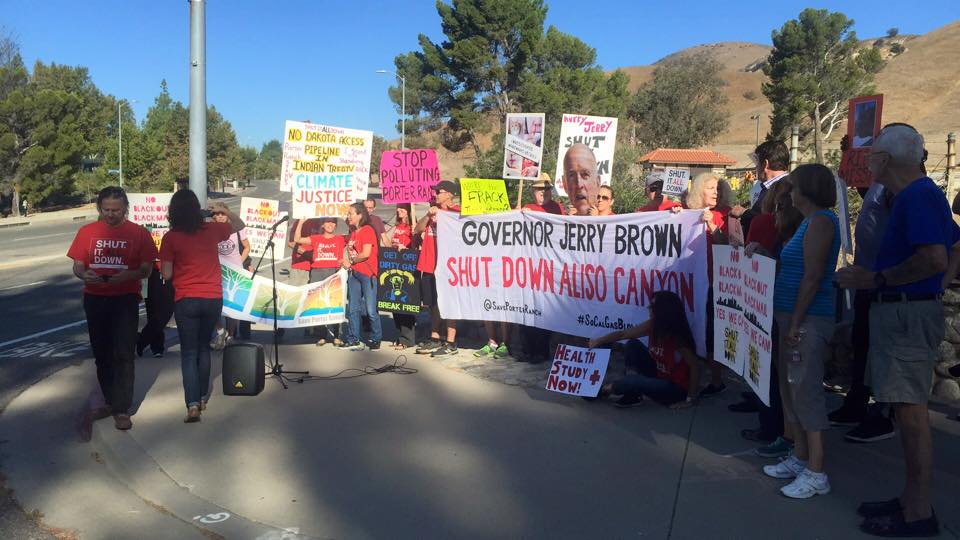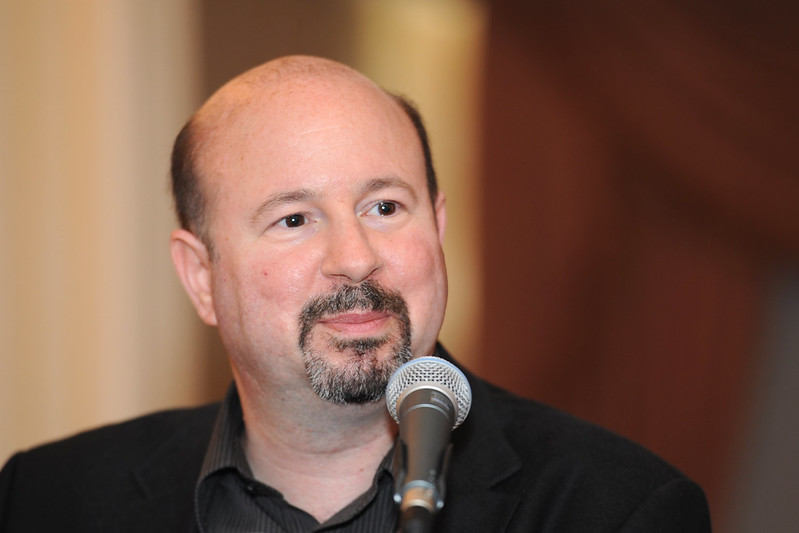Southern California Gas Company (SoCalGas) can meet its summer and winter peak demand without the Aliso Canyon gas storage facility, despite the company’s repeated warnings that blackouts could occur if Aliso stays offline. This is according to a new report prepared for Food & Water Watch and the community group Save Porter Ranch.
The report, Critical Review of Aliso Canyon Winter Risk Assessment and Action Plan, by Bill Powers, P.E. of Powers Engineering, finds that as long as existing mitigation measures remain in place, Aliso Canyon, one of the largest natural gas storage fields in the western U.S. and site of the largest methane leak in U.S. history, is not needed to guarantee either summer or winter gas supplies in the Los Angeles Basin.
In Thursday’s report, Powers refutes SoCalGas claims that permanent closure of Aliso Canyon would threaten gas supplies during peak usage by critiquing two documents released this year by California state regulators. Powers says those documents, a winter risk assessment released in April and a winter action plan released last month, use faulty assumptions about usage and standard mitigation practices and then “editorialize” to create an impression that Aliso Canyon is needed.
Problematic State Reports
The April report, created by the California Public Utilities Commission, California Energy, the California Independent System Operator, the Los Angeles Department of Water and Power, and SoCalGas, was the more problematic of the two reports, Powers tells DeSmog.
“[The agencies] were hammered back in April, and not just by me, for crying wolf by using obsolete numbers to do their modeling,” Powers says. “In the August report, which SoCalGas was not a part of, more accurate data is used but it’s presented with misleading language to reach the conclusions they want.”
Both reports require more expertise to connect those dots than a layperson has, Powers adds.
Powers points out one key way the winter action plan presents data in what he calls an “uncontrolled” manner. The plan’s scenario assumes, without Aliso Canyon, a usage of 5.2 billion cubic feet per day (bcfd) during a peak winter event in 2016-2017. But the same report also states that, factoring in the new winter mitigation measures and continuing those from summer 2016, the maximum demand would be much lower, in the range of 4.1 to 4.2 bcfd.
“They frame mitigation factors like balancing supply and demand and limiting the generators as a curtailment. It’s not. It’s a good management technique,” says Powers.
Powers also criticizes the winter action plan for its assumption that shifting generation outside of the L.A. Basin to minimize natural gas demand on forecasted peak winter days amounts to a “curtailment” of service.
As he says in the report:
This shifting of generation outside the L.A. Basin is not a curtailment, which is generally understood as a cut-off of natural gas in response to an emergency condition. It would be a pre-planned redirection of electricity production to other generating units located outside of the L.A. Basin to meet electric load in the L.A. Basin.
Aliso Canyon contains less than 20 percent of its capacity after a four-month-long leak that began with the October 23, 2015 blowout, which forced the company to release much of the facility’s supply. The state then ordered a moratorium on new natural gas injections and storage at the plant while inspectors checked the wells for safety.
Without Aliso Canyon, three other storage facilities owned by SoCalGas — La Goleta Gas Field west of Santa Barbara, Honor Rancho near Newhall, and Playa del Rey — still produce an “overabundance” of gas, according to Powers and Food & Water Watch.
Missing Blackouts and Muddy Language
State regulators and Southern California Gas warned in their April report — and continued to claim for months — that without Aliso Canyon, Southern Californians could face as many as 14 days of blackouts this summer, a threat that many residents of nearby Porter Ranch called “blackout blackmail.”
As of September 2, the L.A. basin has seen none of the threatened blackouts. Powers says the company’s scare tactics were “bogus” from the beginning.
SoCalGas maintains its position that Aliso Canyon must reopen to meet peak winter demands for gas in the region.
A spokesperson for the company, Melissa Bailey, told DeSmog that SoCalGas executives have not seen the report by Powers and Food & Water Watch, but she pointed to separate and independent analysis conducted by Los Alamos National Laboratory that “concluded that the facility is an integral part of the SoCalGas system” and still necessary to handle potential shortages.
“Restoring natural gas injection at Aliso Canyon to support energy reliability for the winter heating season is critical and without the facility there is an increased risk of natural gas curtailments affecting electric generation plants, hospitals, manufacturers, refineries, and other large users,” says Bailey.
“That’s exactly the kind of muddy language I highlighted in my review,” Powers says about Bailey’s statement. “It’s politicizing with language. Their conclusions are not supported by their own numbers.”
Continued Closure
Powers’ review also shows that keeping Aliso Canyon closed could save ratepayers about $70 million a year.
“The good news is, these documents by state agencies, no matter how they spin it, actually show a road map for not using Aliso,” Powers says.
The Aliso Canyon storage facility leak, which released an estimated 100,000 metric tons of natural gas, caused 8,000 residents, mainly in the nearby Porter Ranch community, to be relocated for months. Some residents who have moved back still complain of headaches, nosebleeds, and nausea. Some have decided to leave permanently.
Residents who want the facility shut down say Powers’ conclusions are vindication of their position.
“There’s a greater chance of a big earthquake happening here than a blackout if Aliso Canyon is shut,” Save Porter Ranch President Matt Pakucko told dozens of protesters rallying near the facility on September 1.
At the same rally, Alex Nagy, senior organizer with Food & Water Watch, told protesters that SoCalGas is still using scare tactics in order to keep Aliso Canyon open because it’s a huge money maker. “SoCalGas stores gas here and does commodities trading, selling it to the highest bidder, to other states and to Mexico,” she said.
Opportunities for Safety Reforms
In a visit to the site during the leak this past winter, U.S. Secretary of Energy Ernest Moniz said Aliso Canyon showed the need for a fresh look at gas storage safety standards nationwide.
One potential reform may be signed by California Governor Jerry Brown this month. On August 26, the California Senate sent SB 887, a bill establishing proactive safety standards for natural gas wells, to the governor.
SB 887, approved overwhelmingly by both houses of the legislature, calls for continuous monitoring for leaks, regular inspections of wells to test their mechanical integrity, and that all wells be equipped with safeguards to ensure that no single point of failure can result in a leak. The standards in the bill are aligned with new regulations proposed by the Division of Oil, Gas & Geothermal Resources, and could become a national model for safety reforms, according to its author, Senator Fran Pavley.
The Senate sent a companion bill to Gov. Brown last week. SB 888, authored by Senator Ben Allen, establishes the state Office of Emergency Services as the lead agency to coordinate responses to any future gas leaks.
Gov. Brown has until September 30 to act on all bills sent to him by the legislature in August.
Subscribe to our newsletter
Stay up to date with DeSmog news and alerts







